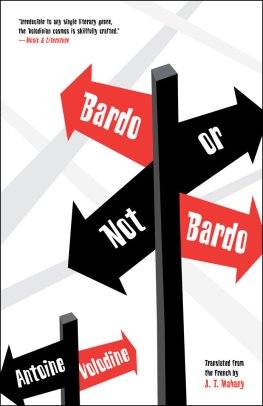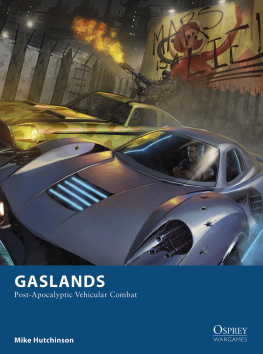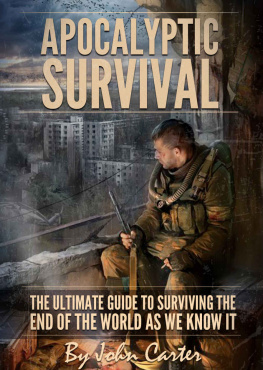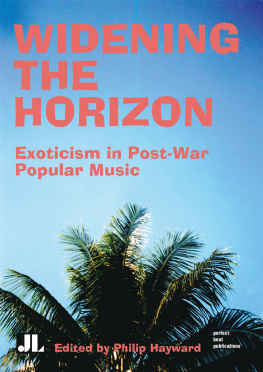Furl N. J. - Post-exoticism in ten lessons, lesson eleven
Here you can read online Furl N. J. - Post-exoticism in ten lessons, lesson eleven full text of the book (entire story) in english for free. Download pdf and epub, get meaning, cover and reviews about this ebook. year: 2015, publisher: Open Letter, genre: Detective and thriller. Description of the work, (preface) as well as reviews are available. Best literature library LitArk.com created for fans of good reading and offers a wide selection of genres:
Romance novel
Science fiction
Adventure
Detective
Science
History
Home and family
Prose
Art
Politics
Computer
Non-fiction
Religion
Business
Children
Humor
Choose a favorite category and find really read worthwhile books. Enjoy immersion in the world of imagination, feel the emotions of the characters or learn something new for yourself, make an fascinating discovery.

- Book:Post-exoticism in ten lessons, lesson eleven
- Author:
- Publisher:Open Letter
- Genre:
- Year:2015
- Rating:5 / 5
- Favourites:Add to favourites
- Your mark:
- 100
- 1
- 2
- 3
- 4
- 5
Post-exoticism in ten lessons, lesson eleven: summary, description and annotation
We offer to read an annotation, description, summary or preface (depends on what the author of the book "Post-exoticism in ten lessons, lesson eleven" wrote himself). If you haven't found the necessary information about the book — write in the comments, we will try to find it.
Abstract: A key book in Antoine Volodines literary universe in which post-exoticist writers are imprisoned for subversion in a post-apocalyptic world.
Post-exoticism in ten lessons, lesson eleven — read online for free the complete book (whole text) full work
Below is the text of the book, divided by pages. System saving the place of the last page read, allows you to conveniently read the book "Post-exoticism in ten lessons, lesson eleven" online for free, without having to search again every time where you left off. Put a bookmark, and you can go to the page where you finished reading at any time.
Font size:
Interval:
Bookmark:
Praise for Antoine Volodine
These wonderful stories fool around on the frontiers of the imagination. All musical dogs, woolly crabs, children, and other detectives of the not-yet-invented should own this book.
Shelley Jackson
His quirky and eccentric narrative achieves quite staggering and electric effects.... Dazzling in its epic proportions and imaginative scope.
The Nation
Volodine isnt afraid to tangle animate and inanimate spirits, or thwart expectations. He delights in breaking down our well-honed meters of whats supposed to happen.
Margaret Wappler, Believer
His textured portraits are convincing and well-rendered, and he has written the type of open-ended work that will capture the attention of lovers of lit crit as fiction.
Publishers Weekly
The ramifying narrative strands of Volodines novels fascinate, but they are almost impossible to describe.
3:AM Magazine
Minor Angels has all the markings of a masterpiece: compression, resonance, and vision.
Terese Svoboda, Literary Review
Also in English by Antoine Volodine (a.k.a., Lutz Bassman & Manuela Draeger)
In the Time of the Blue Ball
Naming the Jungle
Minor Angels
We Monks & Soldiers
Writers

Copyright ditions Gallimard, Paris, 1998
Translation copyright J. T. Mahany, 2015
Originally published in French as Le post-exotisme en dix leons, leon onze
First edition, 2015
All rights reserved
Library of Congress Cataloging-in-Publication Data:
ISBN 978-1-940953-12-0
Cet ouvrage publi dans le cadre du programme daide la publication bnficie du soutien du Ministre des Affaires Etrangres et du Service Culturel de lAmbassade de France reprsent aux Etats-Unis.
[This work, published as part of a program of aid for publication, received support from the French Ministry of Foreign Affairs and the Cultural Service of the French Embassy in the United States.]
This project is supported in part by an award from the National Endowment for the Arts.

Design by N. J. Furl
Open Letter is the University of Rochesters nonprofit, literary translation press: Lattimore Hall 411, Box 270082, Rochester, NY 14627
www.openletterbooks.org

L utz Bassmann passed his final days as we all did, between life and death. A rotten odor stagnated in the cell, which did not come from its occupant, but from outside. The sewers in the city were fermenting, the docks in the harbor were emitting a rancid signal, the covered markets were stinking terribly, as they often did in the springtime when both the waters and the temperature began to rise. The mercury in the thermometers never fell below 34 or 35 Celsius, and it always rose back up from its nightly drop to give way to oppressive grayness. Puddles of mold spread across every wall. In the hours preceding dawn, darkness grew in power in the depths of lungs, under the bed, under the nails. Clouds burst into cataracts under the slightest pretext. The noise of the storm haunted everyone. Ever since Bassmann began to feel unwell, the rain had not ceased its patter against the prisons faade, furnishing the silence with the sound of lead. It streamed over the exterior, crossed over the edge of the window, and gloomily drew lines of rust beneath the bars, onto the bulletin board that certain guards had baptized the union board and which resembled a very old cubist or futurist collage, very dense, very faded. The water zigzagged between the photographs and the newspaper clippings that Bassmann had pinned there, and which helped support him in his stay in the high-security sector, among us: this immobile voyage had already lasted for twenty-seven years, twenty-seven long, long, longer-than-long years. Then, the already-dirty liquid met up with a thin blackish ribbon wending its way to the bottom of the wall, thus mixing with the infiltrations from a leak in the plumbing, perhaps in the toilets outflow pipe. No doubt there, yes, in this pipe, or in a pipe of the same kind. Over several months, the humidity had pierced the cement, which gradually expanded. Thus, when atmospheric pressure dropped, the stench rose. Hence these waves that heavily velveted the surroundings, similar to the vapors of a cadaver on the march toward the nothing. The administration was waiting for Bassmanns death before undertaking any renovations. The guards had made this known to the prisoner with the obtuse frankness common to horrid bipeds, and without snickering, for in their impatience to see the end of history they did not even snicker anymore in front of him when they spoke of his end. Bassmann himself was not waiting for anything. He faced our damaged portraits and sat there watching them. He contemplated the spongy, almost-illegible photographs, the obsolete portraits of his friends, men and women, all dead, and he looked back on who knows what trouble and, at the same time, the fact that he had lived marvelously in their company, when they were all free and shining, the time when all of us, from the first to the last, were something other than. But thats not important. I have said our faces, among us, all of us. This is a process of the literary lie, but one which, here, plays with a truth hidden upstream of the text, with a not-lie inserted into the real reality, elsewhere rather than in fiction. Let us say, in order to simplify, that Lutz Bassmann was our spokesperson to the end, both his and that of everyone and everything. There have been several spokespeople: Lutz Bassmann, Maria Schrag, Julio Sternhagen, Anita Negrini, Irina Kobayashi, Rita Hoo, Iakoub Khadjbakiro, Antoine Volodine, Lilith Schwak, Ingrid Vogel. This list contains deliberate errors and is incomplete. It follows the post-exoticist principle according to which a portion of shadow always subsists in the moment of explanation or confession, modifying the confession to the point of rendering it unusable to the enemy. To objective appearances, the list is only a sarcastic way of telling the enemy one more time that they will learn nothing. For the enemy is always part stalker, disguised and vigilant among readers. We must continue to speak in a way that denies the enemy any profit. We must do this even as we testify before a tribunal whose authority we do not recognize. We devise a solemn proclamation, in a language that appears to be the same as that of the judges, but it is one that the judges listen to with dismay or boredom, as they are incapable of making sense of it... We recite it for ourselves and for men and women not present... Our remarks coordinating in no circumvention of phrase with the magistrates understanding... There was nothing extraordinary about the rain that sounded and rang out in Bassmanns agony during this period; it was completely expected in the month of April. In this region, touched by the tail end of the monsoons, we were in the habit of associating springtime not with green rebirth as is the tradition in occidental literature, but with the slow and loud din of the deluge, mugginess, and mephitic atmospheres. Inside the prison, pestilences alter in intensity by the second as they circulate in an unpredictable manner that prevents any immunization. A feeling of suffocation tormented us from dawn-to-dawn. It is not surprising to discover that psychosomatic illnesses spring up during this phase of the prison calendar. Added to the respiratory troubles are the troubles of solitude. It was extremely difficult for us to converse between cells, on account of all the background noise, from the monotonous sweeping and the trickling that kept on at every hour, muddying the content of our messages. That year, the we was, even more than normally, a literary lie, as much a convention of fiction as Lutz Bassmann was alone. Now he was alone. He had reached the moment of our common adventure that several of us had described, in books completed or otherwise, as that of ultimate defeat. When the last surviving member on the list of the deadand, this time, it was Bassmannstammered his final syllable, then, on this side of the story as well as beyond it, only the enemy would keep strutting straight ahead, undefeated, invincible, and, among the victims of the enemy, no spokesperson would now dare come to interpret or reinterpret any of our voices, or to love us. Lucid despite the split personalities corrupting his agony, Bassmann sought only to communicate with the deceased. He no longer tapped on the washbasin pipes or on the door, saying, for example, Calling cell 546, or on the sealed siphon behind the
Next pageFont size:
Interval:
Bookmark:
Similar books «Post-exoticism in ten lessons, lesson eleven»
Look at similar books to Post-exoticism in ten lessons, lesson eleven. We have selected literature similar in name and meaning in the hope of providing readers with more options to find new, interesting, not yet read works.
Discussion, reviews of the book Post-exoticism in ten lessons, lesson eleven and just readers' own opinions. Leave your comments, write what you think about the work, its meaning or the main characters. Specify what exactly you liked and what you didn't like, and why you think so.











